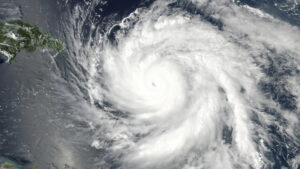This story was originally published by Grist. Sign up for Grist’s weekly newsletter here.
By Siri Chilukuri, Grist
Researchers at the University of Arizona, whose computer model has since 2014 accurately predicted hurricane activity, are calling for a very active hurricane season in 2023, after two years of relative calm. Of nine hurricanes forecast for the period between June and November, five are expected to be “major.”

Forecasters are predicting activity similar to the 2017 hurricane season, which saw Maria, Harvey and Irma make landfall to devastating effect. Though fewer hurricanes overall are expected to make landfall this year, the number of major hurricanes like Maria is expected to be roughly the same.
Major hurricanes refer to those classified as Category 3 and above, with wind speeds up to 150 miles per hour. The average number of major hurricanes per year is two.
A big contributor to a more active hurricane season is hotter ocean temperatures and rising sea levels, according to Xubin Zeng, a researcher at the University of Arizona who leads the forecasts each year.
“With global warming there will be more water vapor over oceans, and water vapor is a fuel for hurricanes,” said Zeng. “That means on average we expect to see more hurricane activity, not necessarily in terms of the [total] number but in terms of the major hurricanes.”
Another phenomenon impacting hurricane season is hotter-than-average ocean-surface temperatures that can create ideal conditions for a hurricane to form.
In addition, rising sea levels are impacting storm surges, when fast-moving storms push a wall of water onto the shore, which dramatically increases the chances of flooding. A 2020 study from the journal Nature projected that by 2100, 68% of coastal flooding will be caused by tides and storms.
Zeng noted that with a potentially active hurricane season, federal and local government agencies have an important role to play. Forecasts like Zeng’s are crucial for the emergency management agencies that provide critical services to people living in affected areas.
Additionally, Zeng noted that people who live on the coast and in the path of hurricanes should be aware of the increasing threats to their home and property as climate change progresses. With a potentially more dangerous hurricane season approaching the East and Gulf coasts, people need to prepare, said Zeng.
This article originally appeared in Grist at https://grist.org/climate/major-hurricanes-expected-increase-2023/.
Grist is a nonprofit, independent media organization dedicated to telling stories of climate solutions and a just future. Learn more at Grist.org



